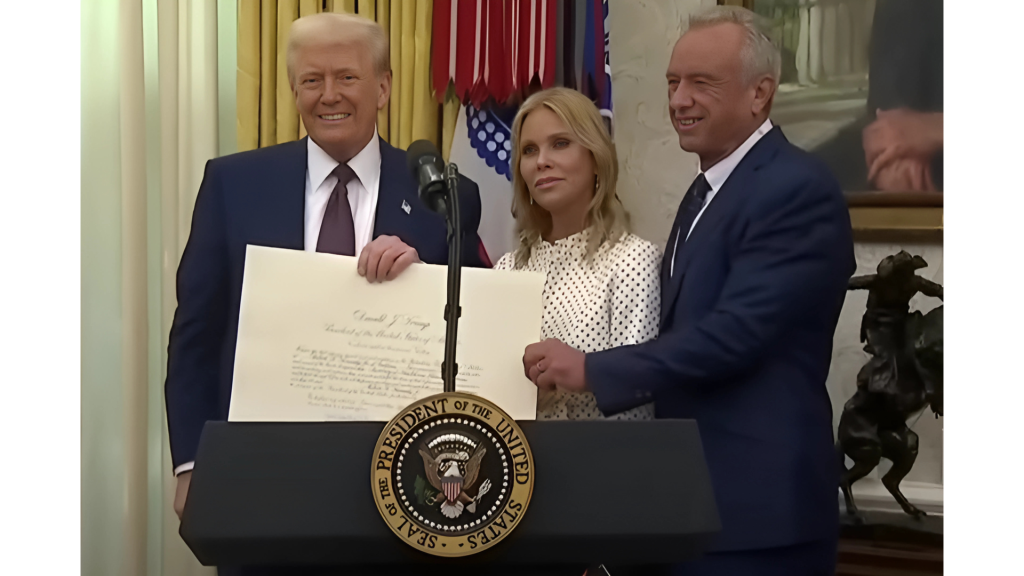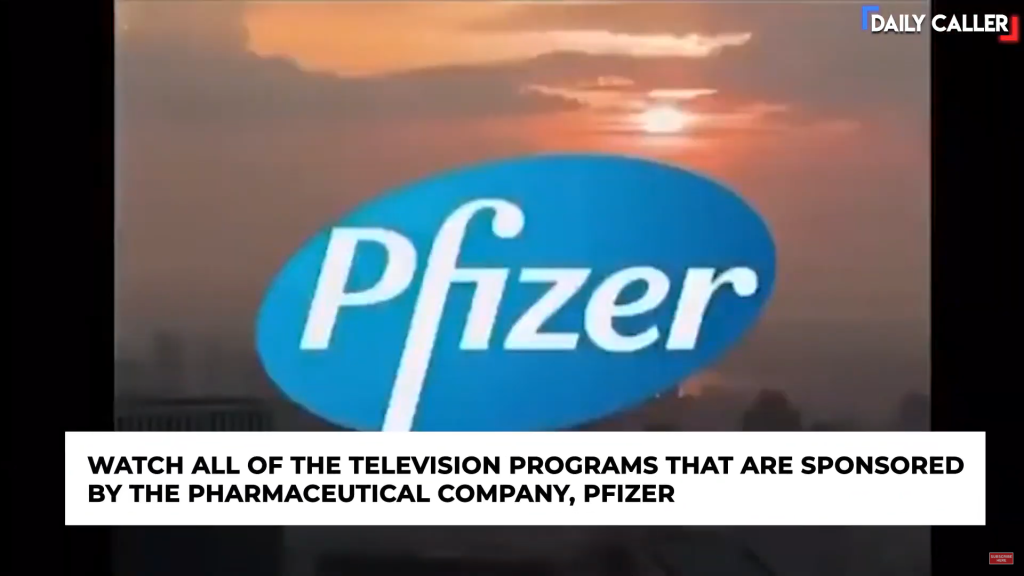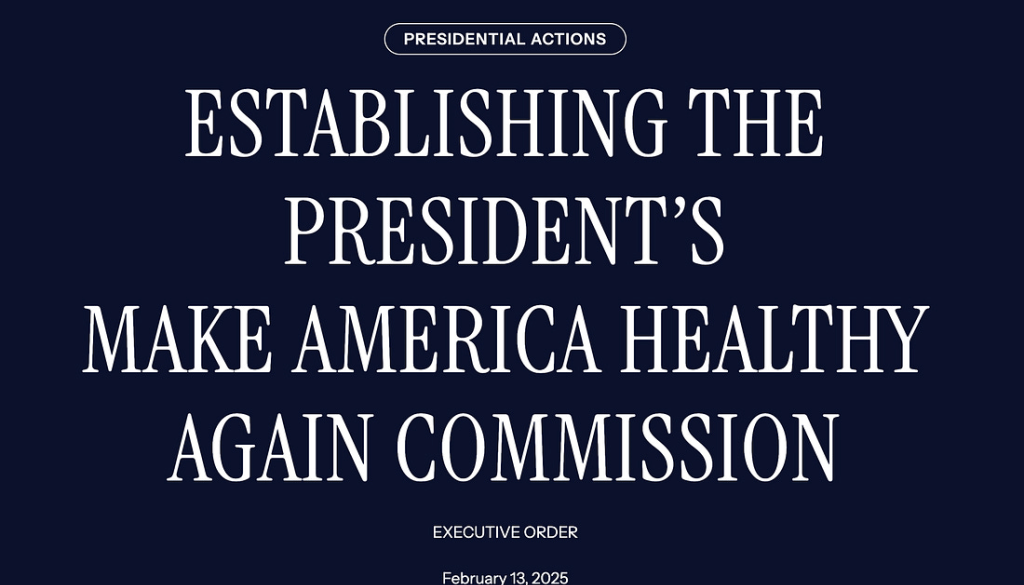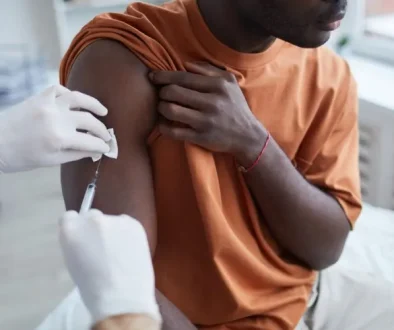Trump Establishes MAHA Commission
RFK Jr. Confirmed As HHS Secretary shows that Robert F. Kennedy Jr. was sworn in as the Secretary of Health and Human Services on February 13. In early 2024, Kennedy stopped his campaign for the US presidency as an independent and joined Trump’s Transition Team. President Trump later nominated Kennedy as Secretary of HHS. The Senate confirmed Kennedy after grueling sessions. Kennedy’s job is to “Make America Healthy Again” (MAHA).
President Trump Establishes MAHA Commission as Kennedy Is Sworn in to Lead HHS 2/14/25
President Trump signed an Executive Order establishing the Make American Health Again Commission and appointing newly-elected Secretary of Health and Human Services (HHS), Robert F. Kennedy Jr., its chair.

Following the signing, in a brief ceremony hosted by Trump from the Oval Office, Supreme Court Justice Neil Gorsuch did the swearing in honors, with Kennedy, his wife Cheryl Hines, and other family members on hand.
After thanking his family, Kennedy reflected on his first time in the Oval Office, in 1962, when he had a meeting with his uncle, President John F. Kennedy, about the environment and the importance of restoring physical fitness to Americans. Kennedy also reflected on the past 20 years — during which, he said, he prayed, every morning, that God would put him in a position to end America’s childhood chronic disease epidemic.
Turning to President Trump, Kennedy continued, “On August 23 of last year, God sent me President Trump . . . He’s kept every promise that he’s made to me, he’s kept his word in every account and gone way beyond it. I’m so grateful to you, Mr. President.” Kennedy went on to call Trump “a pivotal historical figure” who will transform America.
Kennedy’s former presidential running mate, Nicole Shanahan, will serve as an advisor to Kennedy in his new role leading HHS.
According to the White House’s fact sheet, the MAHA Commission will address “the root causes of America’s escalating health crisis, with an initial focus on childhood chronic diseases.” It is tasked with issuing its first report within 100 days producing an “assessment that summarizes what is known and what questions remain regarding the childhood chronic disease crisis…”
Moreover, a strategy document, on ways to improve the health of America’s children, will be produced within 180 days To reverse chronic disease, the MAHA Commission has four main policy directives:
- Empower Americans through transparency and open-source data and avoid conflicts of interest in all federally funded health research.
- Prioritize gold-standard research on why Americans are getting sick in all health-related research funded by the federal government.
- Work with farmers to ensure that U.S. food is healthy, abundant and affordable.
- Ensure expanded treatment options and health coverage flexibility for beneficial lifestyle changes and disease prevention.
The commission hopes to restore trust in medical and scientific institutions and hold public hearings, meetings, roundtables, and other events to garner expert input from leaders in public health.
In its fact sheet, the White House cited statistics delineating the seriousness of the health crisis:
- In the United States, six in 10 adults have at least one chronic condition, and four in 10 have two or more.
- Prior to COVID, American life expectancy averaged 78.8 years, while comparable countries averaged 82.6 years, creating a gap that equates to 1.25 billion fewer life years for Americans.
- The United States has the highest age-standardized cancer incidence rate across 204 countries, nearly double the next-highest rate. From 1990 to 2021, the United States saw an 88% increase in cancer.
- Asthma is far more common in the United States than in other parts of the world, including most of Europe, Asia, and Africa.
The White House also noted that the U.S. spends almost twice per capita what other wealthy countries spend on healthcare and that the rise in chronic conditions is not limited to adults.
The fact sheet also included:
- Childhood is usually the healthiest period of life, yet as of 2022, 30 million (40.7%) United States children had at least one health condition like allergies, asthma, or autoimmune diseases.
- Autism now affects one in 36 children, a staggering increase from rates of one to four out of 10,000 children identified with the condition during the 1980s.
- 18% of teens suffer from fatty liver disease, nearly 30% are prediabetic, and more than 40% are overweight or obese – these conditions were virtually unheard of in prior generations.
- The incidence of childhood cancer, while still rare, has increased 0.8% per year since 1975—an over 40% increase over 45 years.
- Over medication, particularly among children, is a growing concern. More than 3.4 million children are currently taking medication for ADD/ADHD and diagnoses continue to rise.
Finally, the White House cited statistics that have far reaching national impacts:
- 77% of young adults do not qualify for military service without a waiver, primary due to being overweight, drug use, or mental and physical health issues.
- 90% of America’s $4.5 trillion healthcare expenditure is directed at managing chronic and mental health conditions.
Big Ag and Big Pharma On Notice
Kennedy Targets Farm Policy, Has Plans
Drug industry treads carefully after stunning RFK Jr. nomination
Why Big Pharma is terrified of RFK Jr’s ‘make America healthy again’ pledge
RFK Jr. Plans To Ban Big Pharma TV Ads
The United States and New Zealand are the only nations that allow drug companies to advertise on television. So, many programs in America are now “brought to you by Pfizer”.
‘Brought To You By Pfizer’: These Are News Programs That Are Sponsored By Big Pharma

Can the Trump Administration Ban Big Pharma Advertising? Experts Weigh In
A possible ban on DTC pharma ads poses ‘biggest threat’ of RFK Jr.’s HHS appointment: analyst
With Robert F. Kennedy Jr. slated to take the top spot at the U.S. Department of Health and Human Services (HHS) under President-elect Donald Trump, some in the biopharma industry are concerned about his tenure’s possible impacts on companies’ direct-to-consumer outreach.
RFK Jr. has previously expressed a desire to put a stop to DTC pharma ads in the U.S.—which is one of only two countries in the world, along with New Zealand, where prescription drugs can be directly advertised to consumers. In just one example, while still in the presidential race earlier this year, he wrote on X (formerly Twitter), “on my first day in office I will issue an executive order banning pharmaceutical advertising on television.”
In a report Sunday, research firm Intron Health suggested that such a ban represents a major risk of RFK Jr.’s (still to-be-confirmed) HHS leadership for the biopharma industry. “Whilst we have a relatively benign view of RFK’s impact on the Pharma industry, one thing that does worry us is the potential for the US government to ban DTC advertising of drugs,” Intron wrote, adding, “We see this as the biggest imminent threat from RFK and the new Trump administration.”
The analysts noted that because the return on investment for DTC drug ads is quite high—with “estimates ranging as high as 100%-500%, depending on the drug”—pharmas will “almost certainly” see their drug sales take a hit from a DTC ban, even as they save money on marketing spending….
For the incoming administration’s potential impacts on pharma, those industry watchers say, the focus should instead be on Trump’s pick to lead the FDA. For that spot, the president-elect on Friday tapped Johns Hopkins surgeon and author Martin Makary, M.D., a vocal critic of COVID-19 public health policies and of the FDA’s Orphan Drug Act pathway for rare disease treatments.
Makary hasn’t yet shared his views on DTC pharma ads, though he did in 2013 contribute to a study analyzing certain marketing claims by healthcare providers, which ultimately concluded, “Further investigation of provider advertising, its effects on quality of care, and potential oversight mechanisms is needed.”
Medical Freedom’s Golden Age
Episode 411: MEDICAL FREEDOM’S GOLDEN AGE
It’s OFFICIAL! Del reacts to the confirmation of Robert F. Kennedy Jr. as secretary of the U.S. Health and Human Services from the ground in Washington, D.C., marking the beginning of what may well be a golden age for the medical freedom movement.
Then, Jefferey Jaxen reports on the state-level move to hold Fauci accountable while some states are also pursuing bans on mRNA vaccines. Meanwhile, free speech and privacy have become the new global battlegrounds in massive flux.
Finally, Del is joined by the founder of Moms Across America, Zen Honeycutt, to discuss the new move at the state level to give agriculture chemical makers legal protection similar to Big Pharma’s liability shield and, my, how the toxic Girl Scout cookie crumbles.
Why Did Big Pharma/Big Ag Stand Down?
Kennedy as Secretary of Health and Human Services poses a huge threat to both Big Pharma and Big Ag. So, it is puzzling why these two very powerful organizations did not oppose his confirmation. The articles below discuss this puzzle.
Why did Big Pharma Stand Down allowing Robert F. Kennedy Jr. to be confirmed as head of HHS?
Timeline of the Facts
By Michael Kane 2/18/25
The day before Robert Kennedy Jr. was confirmed to be the 26th Secretary of Health & Human Services, POLITICO dropped an eyebrow raising report revealing all of the major medical associations stayed officially silent on whether Kennedy should get the job.
Of course, some of these medical associations had reps who ran their mouths in the media against Kennedy for months, but none of the executive leadership submitted any official letters to the Senate record in regards to Kennedy’s nomination.
Why not?
These omissions are quite shocking!
The 2/12/25 Politico article Why the health care industry is letting RFK Jr. cruise to confirmation referenced in the article above points out: Americans’ top health priorities, according to new polling, now include safe food and water as well as fighting chronic disease, two major tenets of the MAHA movement. “RFK Jr. isn’t just a nominee for a Cabinet position,” said Cybil Roehrenbeck, a partner at law and lobbying firm Hogan Lovells who represents health clients. “He’s also a leader for a major movement in America.”
For More Information
Documentary: First Do No Pharm!
Shocking New Book: The Pfizer Papers
Can Trump Make America Healthy Again?





